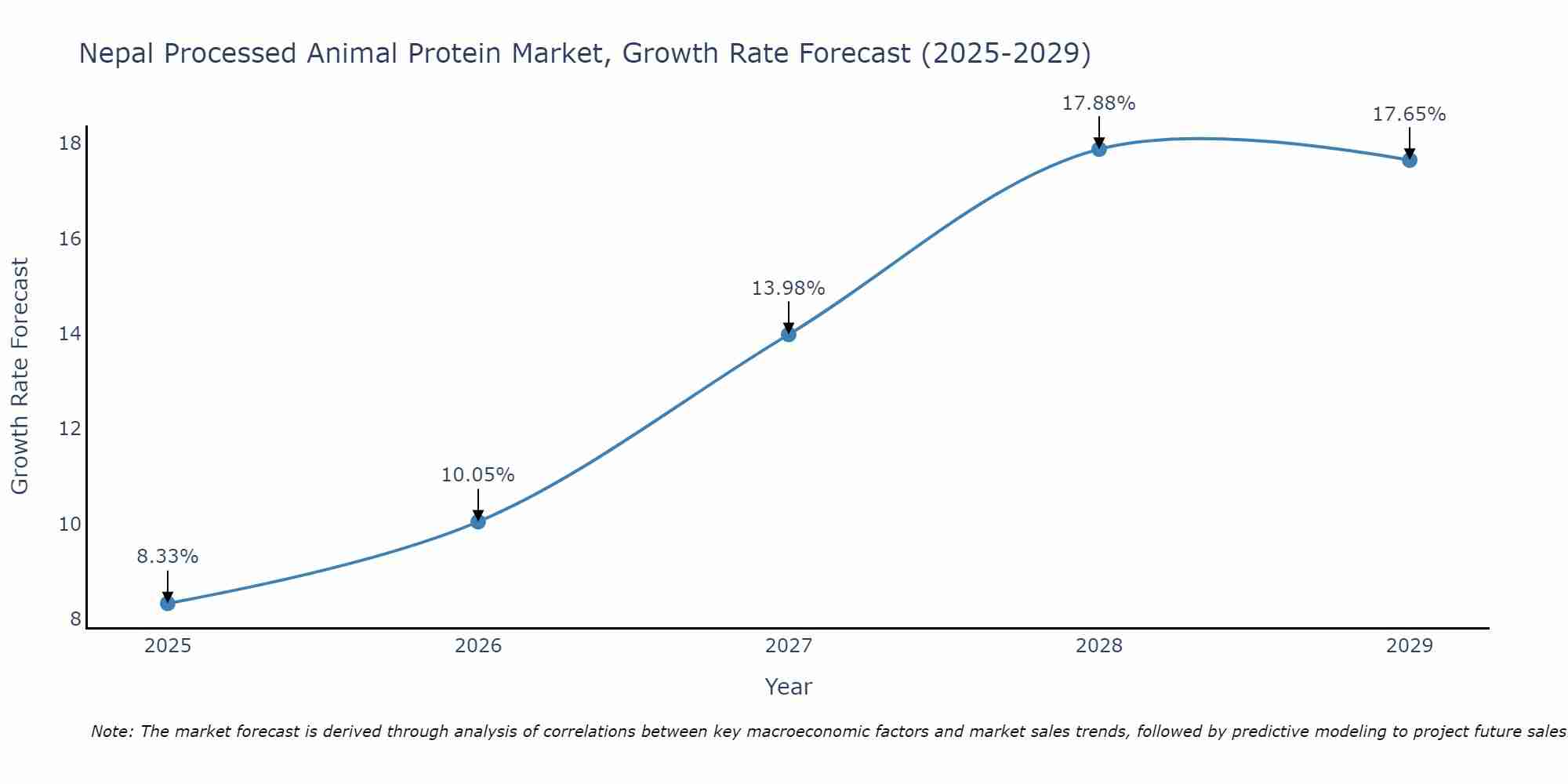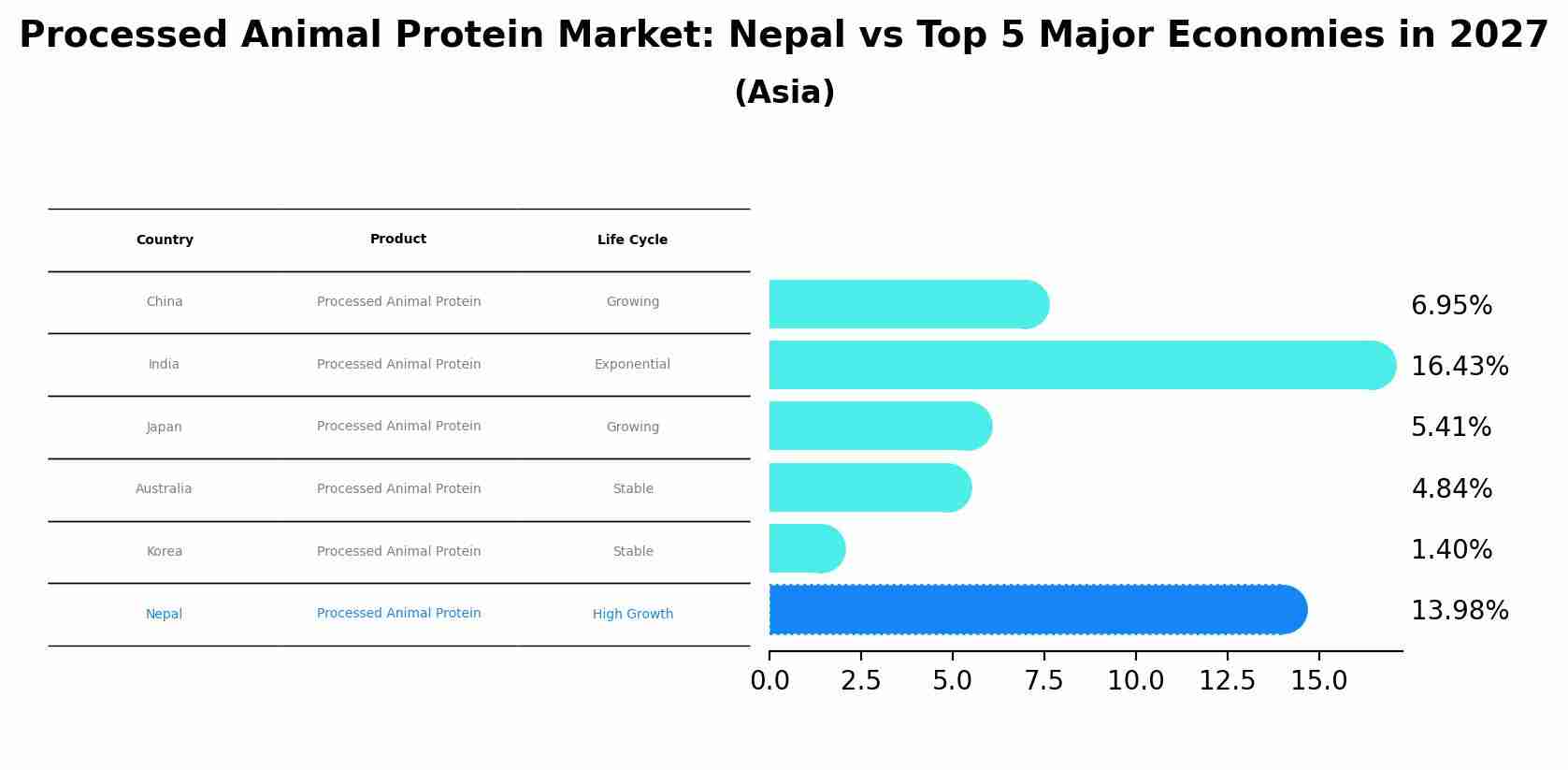Nepal Processed Animal Protein Market (2025-2031) Outlook | Companies, Growth, Share, Size, Trends, Analysis, Revenue, Forecast, Value & Industry
| Product Code: ETC411932 | Publication Date: Oct 2022 | Updated Date: Jul 2025 | Product Type: Market Research Report | |
| Publisher: 6Wresearch | Author: Shubham Deep | No. of Pages: 75 | No. of Figures: 35 | No. of Tables: 20 |
Nepal Processed Animal Protein Market Size Growth Rate
The Nepal Processed Animal Protein Market is projected to witness mixed growth rate patterns during 2025 to 2029. The growth rate begins at 8.33% in 2025, climbs to a high of 17.88% in 2028, and moderates to 17.65% by 2029.

Processed Animal Protein Market: Nepal vs Top 5 Major Economies in 2027 (Asia)
By 2027, the Processed Animal Protein market in Nepal is anticipated to reach a growth rate of 13.98%, as part of an increasingly competitive Asia region, where China remains at the forefront, supported by India, Japan, Australia and South Korea, driving innovations and market adoption across sectors.

Nepal Processed Animal Protein Market Synopsis
The Nepal Processed Animal Protein Market is experiencing steady growth due to increasing consumer demand for protein-rich food products. Factors such as rising disposable incomes, urbanization, and changing dietary habits are driving the market expansion. Key players in the market offer a variety of processed animal protein products, including meat snacks, sausages, canned meat, and frozen meat products. The market is also witnessing a trend towards healthier and more convenient protein options, leading to the introduction of value-added products such as organic and low-fat meat items. However, challenges such as quality control issues, distribution challenges, and price fluctuations due to external factors like weather conditions can impact market growth. Overall, the Nepal Processed Animal Protein Market shows promise for further development and innovation to cater to evolving consumer preferences.
Nepal Processed Animal Protein Market Trends
In the Nepal Processed Animal Protein Market, a notable trend is the increasing demand for convenience and ready-to-eat animal protein products. Consumers are seeking quick and easy meal solutions that offer both nutrition and taste, driving the growth of processed animal protein options such as canned meats, sausages, and ready-to-cook items. Additionally, there is a growing preference for healthier and sustainable protein sources, leading to the popularity of processed animal protein products that are organic, free-range, or ethically sourced. Manufacturers in Nepal are focusing on product innovation to cater to these evolving consumer preferences, introducing new flavors, packaging formats, and healthier ingredient options. Overall, the market is witnessing a shift towards convenience, health-consciousness, and sustainability in processed animal protein products.
Nepal Processed Animal Protein Market Challenges
In the Nepal Processed Animal Protein Market, several challenges are faced that hinder market growth. One major challenge is the lack of modern processing facilities and technology, leading to limited production capacity and lower quality products. Additionally, the inconsistent supply of raw materials due to factors such as climate change and natural disasters further impacts market stability. Moreover, inadequate infrastructure for storage and distribution adds to the difficulties in reaching consumers effectively. Furthermore, competition from imported processed animal protein products poses a threat to domestic producers. Addressing these challenges will require investments in upgrading processing facilities, improving supply chain management, and enhancing product quality to meet consumer demands and increase market competitiveness.
Nepal Processed Animal Protein Market Investment Opportunities
In the Nepal Processed Animal Protein Market, there are several investment opportunities worth considering. With the increasing demand for convenient and nutritious food products, investing in the production and distribution of processed animal protein products such as sausages, canned meats, and ready-to-eat meals can be lucrative. Additionally, there is a growing trend towards organic and sustainable meat products, presenting opportunities for investment in ethically sourced and environmentally friendly processed animal protein options. Collaborating with local farmers and producers to establish a reliable supply chain can also be a strategic investment in this market. Overall, the Nepal Processed Animal Protein Market offers potential for growth and innovation, making it an attractive sector for investors looking to capitalize on changing consumer preferences and market dynamics.
Jordan Agar Market Government Policies
Government policies related to the Nepal Processed Animal Protein Market include regulations on food safety, quality control, and import/export procedures enforced by the Department of Food Technology and Quality Control. The government also provides subsidies and incentives to promote the growth of the processed animal protein industry, aimed at increasing production capacity, improving product quality, and enhancing competitiveness in both domestic and international markets. Additionally, there are regulations on labeling and packaging requirements to ensure consumer protection and transparency in product information. The government`s focus on promoting sustainable and ethical practices in the processed animal protein market aligns with efforts to support the overall growth and development of the agriculture and food industry in Nepal.
Nepal Processed Animal Protein Market Future Outlook
The Nepal Processed Animal Protein Market is expected to witness steady growth in the coming years due to factors such as increasing urbanization, rising disposable incomes, and changing dietary preferences towards protein-rich foods. The market is likely to be driven by the growing demand for processed meat products, such as sausages, burgers, and nuggets, as well as pet food. Additionally, advancements in food processing technologies and the expansion of distribution networks are anticipated to further propel market growth. However, challenges related to food safety regulations, supply chain disruptions, and price volatility of raw materials may hinder the market`s growth to some extent. Overall, the Nepal Processed Animal Protein Market is forecasted to experience moderate growth with opportunities for innovation and product diversification.
Key Highlights of the Report:
- Nepal Processed Animal Protein Market Outlook
- Market Size of Nepal Processed Animal Protein Market, 2024
- Forecast of Nepal Processed Animal Protein Market, 2031
- Historical Data and Forecast of Nepal Processed Animal Protein Revenues & Volume for the Period 2021 - 2031
- Nepal Processed Animal Protein Market Trend Evolution
- Nepal Processed Animal Protein Market Drivers and Challenges
- Nepal Processed Animal Protein Price Trends
- Nepal Processed Animal Protein Porter's Five Forces
- Nepal Processed Animal Protein Industry Life Cycle
- Historical Data and Forecast of Nepal Processed Animal Protein Market Revenues & Volume By Source for the Period 2021 - 2031
- Historical Data and Forecast of Nepal Processed Animal Protein Market Revenues & Volume By Poultry for the Period 2021 - 2031
- Historical Data and Forecast of Nepal Processed Animal Protein Market Revenues & Volume By Pork for the Period 2021 - 2031
- Historical Data and Forecast of Nepal Processed Animal Protein Market Revenues & Volume By Beef for the Period 2021 - 2031
- Historical Data and Forecast of Nepal Processed Animal Protein Market Revenues & Volume By Others for the Period 2021 - 2031
- Historical Data and Forecast of Nepal Processed Animal Protein Market Revenues & Volume By Form for the Period 2021 - 2031
- Historical Data and Forecast of Nepal Processed Animal Protein Market Revenues & Volume By Dry for the Period 2021 - 2031
- Historical Data and Forecast of Nepal Processed Animal Protein Market Revenues & Volume By Liquid for the Period 2021 - 2031
- Nepal Processed Animal Protein Import Export Trade Statistics
- Market Opportunity Assessment By Source
- Market Opportunity Assessment By Form
- Nepal Processed Animal Protein Top Companies Market Share
- Nepal Processed Animal Protein Competitive Benchmarking By Technical and Operational Parameters
- Nepal Processed Animal Protein Company Profiles
- Nepal Processed Animal Protein Key Strategic Recommendations
Frequently Asked Questions About the Market Study (FAQs):
- Single User License$ 1,995
- Department License$ 2,400
- Site License$ 3,120
- Global License$ 3,795
Search
Related Reports
- Vietnam System Integrator Market (2025-2031) | Size, Companies, Analysis, Industry, Value, Forecast, Growth, Trends, Revenue & Share
- ASEAN and Thailand Brain Health Supplements Market (2025-2031) | Strategy, Consumer Insights, Analysis, Investment Trends, Opportunities, Growth, Size, Share, Industry, Revenue, Segments, Value, Segmentation, Supply, Forecast, Restraints, Outlook, Competition, Drivers, Trends, Demand, Pricing Analysis, Competitive, Strategic Insights, Companies, Challenges
- ASEAN Bearings Market (2025-2031) | Strategy, Consumer Insights, Analysis, Investment Trends, Opportunities, Growth, Size, Share, Industry, Revenue, Segments, Value, Segmentation, Supply, Forecast, Restraints, Outlook, Competition, Drivers, Trends, Demand, Pricing Analysis, Competitive, Strategic Insights, Companies, Challenges
- Europe Flooring Market (2025-2031) | Outlook, Share, Industry, Trends, Forecast, Companies, Revenue, Size, Analysis, Growth & Value
- Saudi Arabia Manlift Market (2025-2031) | Outlook, Size, Growth, Trends, Companies, Industry, Revenue, Value, Share, Forecast & Analysis
- Uganda Excavator, Crane, and Wheel Loaders Market (2025-2031) | Strategy, Consumer Insights, Analysis, Investment Trends, Opportunities, Growth, Size, Share, Industry, Revenue, Segments, Value, Segmentation, Supply, Forecast, Restraints, Outlook, Competition, Drivers, Trends, Demand, Pricing Analysis, Competitive, Strategic Insights, Companies, Challenges
- Rwanda Excavator, Crane, and Wheel Loaders Market (2025-2031) | Strategy, Consumer Insights, Analysis, Investment Trends, Opportunities, Growth, Size, Share, Industry, Revenue, Segments, Value, Segmentation, Supply, Forecast, Restraints, Outlook, Competition, Drivers, Trends, Demand, Pricing Analysis, Competitive, Strategic Insights, Companies, Challenges
- Kenya Excavator, Crane, and Wheel Loaders Market (2025-2031) | Strategy, Consumer Insights, Analysis, Investment Trends, Opportunities, Growth, Size, Share, Industry, Revenue, Segments, Value, Segmentation, Supply, Forecast, Restraints, Outlook, Competition, Drivers, Trends, Demand, Pricing Analysis, Competitive, Strategic Insights, Companies, Challenges
- Angola Excavator, Crane, and Wheel Loaders Market (2025-2031) | Strategy, Consumer Insights, Analysis, Investment Trends, Opportunities, Growth, Size, Share, Industry, Revenue, Segments, Value, Segmentation, Supply, Forecast, Restraints, Outlook, Competition, Drivers, Trends, Demand, Pricing Analysis, Competitive, Strategic Insights, Companies, Challenges
- Israel Intelligent Transport System Market (2025-2031) | Strategy, Consumer Insights, Analysis, Investment Trends, Opportunities, Growth, Size, Share, Industry, Revenue, Segments, Value, Segmentation, Supply, Forecast, Restraints, Outlook, Competition, Drivers, Trends, Demand, Pricing Analysis, Competitive, Strategic Insights, Companies, Challenges
Industry Events and Analyst Meet
Our Clients
Whitepaper
- Middle East & Africa Commercial Security Market Click here to view more.
- Middle East & Africa Fire Safety Systems & Equipment Market Click here to view more.
- GCC Drone Market Click here to view more.
- Middle East Lighting Fixture Market Click here to view more.
- GCC Physical & Perimeter Security Market Click here to view more.
6WResearch In News
- Doha a strategic location for EV manufacturing hub: IPA Qatar
- Demand for luxury TVs surging in the GCC, says Samsung
- Empowering Growth: The Thriving Journey of Bangladesh’s Cable Industry
- Demand for luxury TVs surging in the GCC, says Samsung
- Video call with a traditional healer? Once unthinkable, it’s now common in South Africa
- Intelligent Buildings To Smooth GCC’s Path To Net Zero













